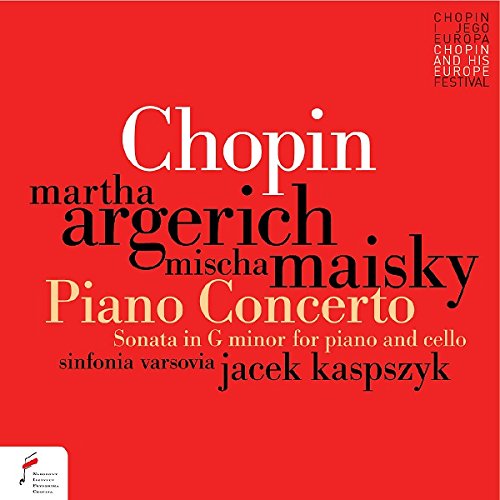CHOPIN Piano Concerto No 1
View record and artist detailsRecord and Artist Details
Composer or Director: Fryderyk Chopin
Genre:
Orchestral
Label: NIFC
Magazine Review Date: 11/2015
Media Format: CD or Download
Media Runtime: 79
Mastering:
DDD
Catalogue Number: NIFCD038

Tracks:
| Composition | Artist Credit |
|---|---|
| Concerto for Piano and Orchestra No. 1 |
Fryderyk Chopin, Composer
Fryderyk Chopin, Composer Jacek Kaspszyk, Conductor Martha Argerich, Piano Sinfonia Varsovia |
| Sonata for Cello and Piano |
Fryderyk Chopin, Composer
Fryderyk Chopin, Composer Martha Argerich, Piano Mischa Maisky, Cello |
| Introduction and Polonaise brillant |
Fryderyk Chopin, Composer
Fryderyk Chopin, Composer Martha Argerich, Piano Mischa Maisky, Cello |
Author: Harriet Smith
The orchestral tuttis are given straight, without the sense of unearthing new details that was so striking about Jun Märkl’s direction of the Scottish CO for Fliter – but the point here is surely Argerich’s pianism. She seems to stop time itself through sheer eloquence in the solo passages, while being effortlessly reactive and playful in the many scherzo-ish moments. What’s impressive about Kaspszyk is the way he manages to follow her unpredictable lead almost unfailingly. The reading is also full of deliciously spontaneous touches – duetting with an oboe here, a bassoon there. The finale, steadier than some of Argerich’s previous performances, is alive with incident, and the glistening, glittering ending demonstrates marvellously crisp passagework from this eternally youthful pianist.
A day after the concerto, Argerich was back for more, this time in the company of Mischa Maisky. That this is a phenomenal partnership is not in question, the two offering a reading of the Cello Sonata that is highly personal and utterly organic. Yet here I find an insuperable problem: Maisky’s vibrato, which is ever-present and which can resort to histrionic sobbing at moments of intensity. It ends up feeling very claustrophobic in a way that the energised new reading from Weilerstein and Barnatan certainly doesn’t (see page 50). The slow movement suffers most in this regard: here du Pré and Barenboim, at a slightly faster pace, have a wonderfully confiding quality. That’s true also of Gerhardt and Osborne, though at times their rubato can seem a little overdone. Jamie Walton and Daniel Grimwood offer a fine middle ground here, and they also include the Introduction and Polonaise brillante; though Grimwood can’t quite match the electricity of Argerich, he and Walton show that less is more and make a much more compelling case for the piece.
Discover the world's largest classical music catalogue with Presto Music.

Gramophone Digital Club
- Digital Edition
- Digital Archive
- Reviews Database
- Full website access
From £8.75 / month
Subscribe
Gramophone Full Club
- Print Edition
- Digital Edition
- Digital Archive
- Reviews Database
- Full website access
From £11.00 / month
Subscribe
If you are a library, university or other organisation that would be interested in an institutional subscription to Gramophone please click here for further information.




